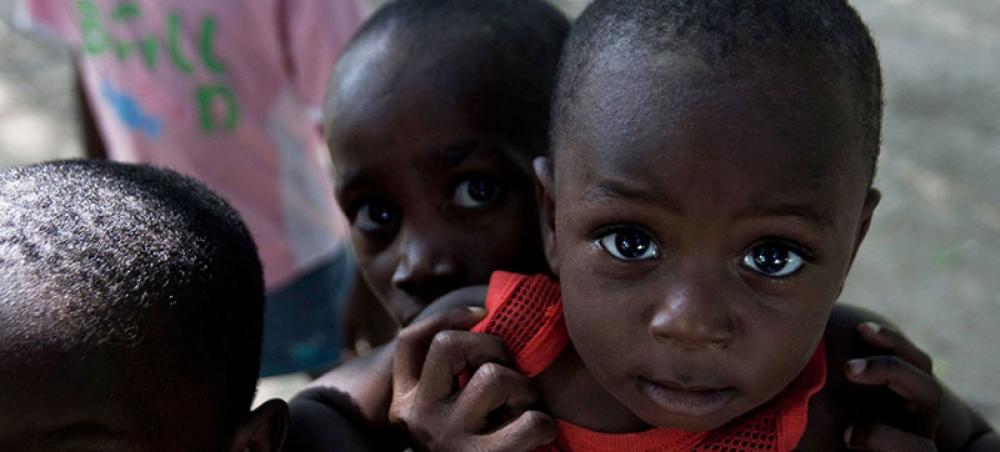Just Earth News | @justearthnews | 04 Sep 2021, 05:50 am Print
 Haiti Earthquake
Haiti Earthquake Image: MINUSTAH/Logan Abassi
New York: A crippling earthquake followed by plummeting rains have put some 540,000 children in southwest Haiti at risk of life-threatening waterborne diseases, the UN Children’s Fund (UNICEF) has warned.
“The lives of thousands of earthquake-affected children and families are now at risk, just because they don’t have access to safe water, sanitation and hygiene”, Bruno Maes, UNICEF Representative in Haiti said on Thursday.
A 7.2 magnitude earthquake that ripped through the Caribbean island State on 14 August, was followed days later by Tropical Depression Grace, which exacerbated the suffering and increased the devastation.
Threat increasing daily
More than a half million children in southwestern Haiti without access to shelter, drinking water and hygiene facilities are increasingly under threat from acute respiratory infections, diarrhoeal diseases, cholera and malaria, according to UNICEF.
“Cholera has not been reported in Haiti since February 2019, yet without urgent and firmer action the re-emergence of cholera and other waterborne diseases is a real threat that is increasing by the day”, said Mr. Maes.
UNICEF is calling on the international community to urgently provide additional funding for the humanitarian response and prevent the emergence of waterborne diseases in Haiti.
Prior to 14 August, only over half of the healthcare facilities in the country’s three departments most shaken by the earthquake had basic access to water services.
In its aftermath, nearly 60 per cent of people in those three departments lack safe water, as thousands whose houses collapsed lost access to sanitation, due in part to the earthquake.
Stepping up, stepping in
Along with the National Directorate for Water and Sanitation (DINEPA) and other partners, UNICEF aims to improve access to water, sanitation and hygiene facilities (WASH) for affected families.
The agency is already providing clean water to 73,600 people through six water treatment plants, water trucks and twenty-two bladder containers. Besides that, more than 35,200 people have also been given hygiene kits, including household water treatments products, water storage, handwashing devices and hygiene pads.
UNICEF is the only UN agency delivering safe drinking water to the affected population and aims to reach 500,000 people with WASH support.
And yet, Mr. Maes said, “our efforts to deliver more safe drinking water don’t match the dire needs in all the affected areas”.
Untenable situation
Meanwhile, persistent political instability, socio-economic crisis and rising food insecurity continues to plague the country, rocked by the assassination of President Jovenel Moïse in early July.
“Impatience and sometimes frustration are mounting in some Haitian communities, and this is understandable. But obstructing relief operations won’t help”, said the UNICEF representative.
“In the past few days, several distributions of essential hygiene items had to be temporarily put on hold as tensions arose on the ground. Together with financial constraints, insecurity is currently slowing down our lifesaving activities”, he added.
Call for assistance
Against the backdrop of gang-related violence and internal displacement, the COVID-19 pandemic, as well as a Haitian-Dominican migration influx, UNICEF is calling on local authorities to ensure safe conditions for humanitarian organizations to deliver relief assistance to and operate in earthquake-affected communities.
In addition to a $48.8 million appeal made for 2021, the UN agency is now requesting a $73.3 million humanitarian appeal for children, to scale up interventions in response to the earthquake and the internally displaced persons.
So far, less than one percent of this funding has been received.
- Coffee and tea: This everyday drink may help protect your brain from dementia
- Happy Chocolate Day! The sweet secret behind chocolate’s hidden benefits
- Cambridge study finds menopause affects memory, mood, and sleep
- Nipah horror returns: WHO confirms death of a woman in Bangladesh
- Falling birth rates blamed on COVID shots? New research says think again





-1763561110.jpg)
